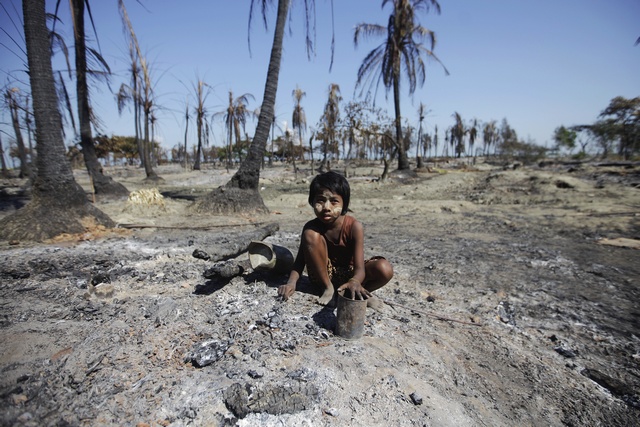The Burmese government on Monday morning began to relocate some of the thousands of displaced Rohingya Muslims stuck in camps in western Burma, as a tropical cyclone moves closer to battering the conflict-torn region, according to local sources.
Cyclone Mahasen is expected to strike northern Arakan state — where nearly 70,000 stateless Rohingya Muslims are living in low-lying camps vulnerable to flooding — by Thursday morning, according to meteorologists.
But aid workers say that the government is only taking preliminary measures to protect internally displaced persons (IDPs) – by moving them further inland within camp areas already designated for the Rohingya.
“At the moment, there is an ongoing relocation of IDPs, but it’s still within the rural Sittwe area, which is where the Muslim camps are,” Dancho Arizankoski from the Danish Refugee Council (DRC) in the Arakan capital told DVB. “So what they are doing is relocating people from more prone to less prone areas.”
The UN has issued a Red Storm alert for Cyclone Mahasen, which is currently packing winds of up to 100 kph (60 mph), and heading towards Chittagong in southern Bangladesh.
But depending on its final trajectory it could cause life-threatening winds, floods and land-slides across large parts of northern Arakan state, raising particular concerns for displaced Rohingya, who constitute the majority of the 140,000 people uprooted in two bouts of ethno-religious clashes with Buddhist Arakanese last year.
Arizankoski added that state officials have instructed a number of displaced Rohingyas — who the government does not recognise as IDPs — “to return to their places of origin”. Aid workers say that as many as 10,000 Rohingyas remain “unregistered” by the government, even though they have lost their houses and livelihoods in the wake of last year’s violence – often as a direct result of the government’s policy of segregation.
State officials have also issued cyclone warnings and updates through TV, radio and loudspeakers across Arakan state, but Sittwe residents say these are mainly directed at the Buddhist population.
“They’ve made some announcements on TV and radio, but they did not make announcements village to village,” Aung Win, a local Rohingya resident, told DVB, adding that “they broadcast in the Burmese language, sometimes in Rakhine, but not in Rohingya.”
A set of instructions issued by the Ministry of Information advises people to stock up on a week’s supply of food, torch lights and regularly tune into the radio for updates. But Rohingya IDPs are kept segregated in dismal camps, where they survive on small portions of rice and salt provided by humanitarian agencies, and have no access to TV or radio.
“Coconut garden is very close to the sea and they are living under tarpaulin, so how will they cover themselves when the storm hits?” said Aung Win, referring to one of the most vulnerable IDP camps outside Sittwe, which houses nearly 4,000 Rohingyas.
Aid workers are also particularly concerned about IDPs in Pauktaw township, east of Sittwe, where over 17,000 Rohingyas are camped in sodden paddy fields next to the open sea.
“In Pauktaw, which is for me the most dangerous situation, there is no serious plan in place,” said Arizankoski. “The only plan is to bring the people to nearby villages, but even the nearby villages are not quite safe.”
On Sunday, the government held an emergency meeting in Maungdaw township, which has a majority Rohingya population, to discuss evacuation plans. According to the UN, “relocation sites have been identified and people living in high risk coastal areas” will be moved to safety on Monday.
But a spokesperson for the UN Refugee Agency (UNHCR) told DVB that they “are not directly involved” in the relocation process. “The government is leading the effort. We’re waiting to see how we can help,” said Vivian Tan, adding that their primary role is to construct temporary shelters in Pauktaw and Myebon in preparation for the rainy season.
The Burmese government has come under fire for its treatment of Rohingya Muslims in western Burma – who they do not recognise as citizens – and was recently accused of ethnic cleansing in a report by Human Rights Watch.
Activists are concerned that some state officials — who were directly implicated in the report – could use Cyclone Mahasen as an opportunity to further persecute the Muslim minority.
The storm warnings mirror those of 2008, when Cyclone Nargis struck Burma, causing the worst natural disaster in the country’s history and killing nearly 140,000 people. Two years later, Arakan state was struck by Cyclone Giri, a powerful tropical cyclone, which destroyed some 15,000 homes.



